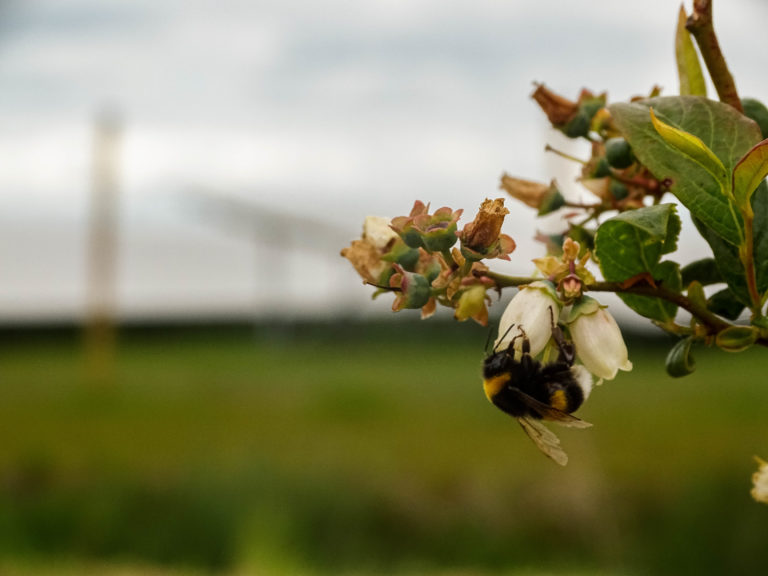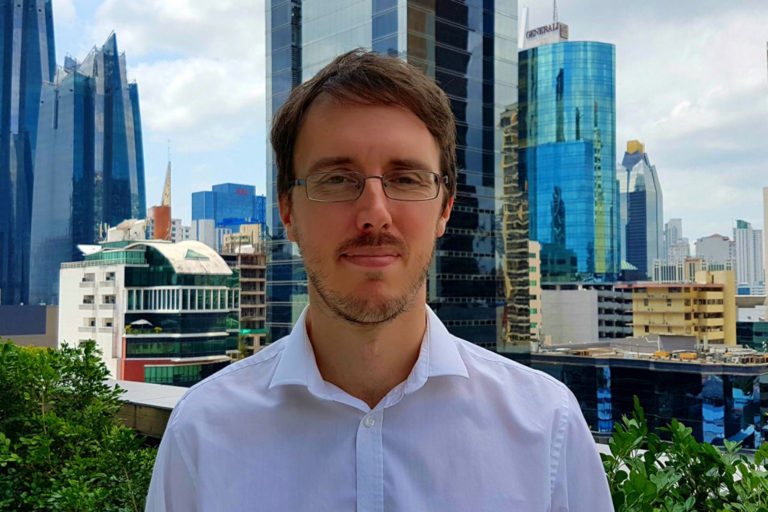Day in the life of Peter Allen, Senior Asset Manager

With a background in Accounting and Finance, Peter joined Solarcentury as our first Asset Manager. He works on our international projects and tells us all about his experience and role here…
What is your background, and how did you end up at Solarcentury?
I’ve worked in energy since the start of my career, always in finance-based roles. Energy is a hot topic right now – everyone needs energy and there are significant changes happening to how we source and use it. I think it’s this shift that makes it a really interesting industry.
I started on a finance graduate scheme with an energy supplier in Newcastle, where my first rotation was in the wind power sector. This was where I got hooked on renewables. My next rotation was in the wholesale markets optimisation team in London. A very different role, but I really enjoyed the world of power and gas trading.
I knew I wanted to get back into the renewables industry, so when the opportunity came up to become Solarcentury’s first Asset Manager, I went for it. It was a chance to apply my experience in a brand new department and in international markets. Plus – one of the requirements was some Dutch. I’d lived in the Netherlands with my family so it was an added bonus to have the opportunity to revisit. And here we are, a year and a half later!
Why solar?
Solar is a fast-paced, exciting area to work in. The industry is changing from all angles – the shift away from government subsidies means that project business models are constantly evolving. There are new risks and challenges involved in how you earn revenues from a solar farm, which makes a big impact in the way the projects are financed. The pace of innovation is relentless – we constantly hear about new products and technologies. Projects come through quickly, and it only takes a few months to build a large solar farm; smaller projects can take around 6 weeks, which means decarbonising the grid is getting faster and faster.
The fact that I work for a company that is making a difference in the fight against the climate crisis is rewarding. It definitely has a feel-good factor, knowing I’m doing my bit to save the planet.
What does the asset management team do?
Each project is like a standalone business, and just like any company, it needs to be managed. We make sure that our solar farms operate safely and efficiently, so that the production of clean power, as well as financial returns for investors are maximised.
Making this happen involves managing financial, commercial, legal and technical aspects – from compliance with project financing agreements, to reporting back to investors, to negotiating with local councils, and monitoring the Operation and Maintenance of the projects. We work closely with a few different teams in the company.

Your role hasn’t been purely managing completed projects. What else have you been involved in?
I managed the project financing for Budel in the Netherlands, as well as the crowdfunding campaign which saw 96 Dutch residents invest EUR250,000 in the solar farm. It was a challenging task, as it was a first for us, and one of the first few projects for our crowdfunding partner, Rabo & Crowd, but it was really successful – we raised the funds in just six weeks! I enjoyed taking ownership of this, liaising with the bank and making sure everyone was satisfied with the results.
We now know how to approach the process, and how the idea works in practice, which is useful when planning the financial models for some of our upcoming projects in France and the Netherlands, where we also plan to implement crowdfunding schemes.

Our Spanish projects have been moving through the final stages of development and into construction, so I’ve been working on this too. I started by working on the route-to-market contract for Talayuela Solar, where my experience in wholesale power markets came in handy. I then joined the team working on the Power Purchase Agreements for both our Talayuela and Cabrera projects. Both solar farms are being built without subsidies, so we’ve entered into financial contracts in order to hedge the power price; these contracts are some of the largest of their kind in Europe so they were really interesting deals to be involved in.
I was involved in the Project Financing for Talayuela, which we recently completed. There were a lot of moving parts, and lots of people involved – lenders, our co-investor, legal advisors, technical advisors. There was always a lot to think about to ensure everything was in place on time to close the deal.
Because Solarcentury is expanding fast in its international businesses, I often find myself doing things that nobody in the company has done before, which is an amazing experience. We’ve got quite a few projects in the pipeline, there’s always something exciting going on, and you can’t be bored.
Travelling is a big part of your job – do you enjoy it?
I do enjoy it – it’s nice getting to spend a few days in sunny Valencia, especially during the autumn/winter season when London doesn’t offer the best weather. And getting to work closely with our international teams is great.
Travelling a lot does have its downsides and we need think about the environmental impact flights have and only travel if completely necessary. It’s important not to lose track of the overall goal in a business like ours; completing a new project and generating clean electricity sooner. When we book our flights, we can see the amount of CO2 they will emit, not just the monetary cost, which is a good way to make us think about the impact the trip has.
I make an effort to take the train to the Netherlands when I can, which definitely helps reduce our carbon footprint, but unfortunately the Eurostar doesn’t reach Spain just yet. Hopefully one day we’ll be able to travel impact-free.
What makes working in SC special?
Solarcentury is the type of place where you can take on a lot of different opportunities and projects which might not be in your job description – I think in some companies you can have a much more defined role, so I like the flexibility. As the first Asset Manager in the company, I’ve had a bit of a blank canvas and got to shape the role to become what it is now.
I’ve had the opportunity to take on more responsibility, learn new skills and work with many different teams. Yes, sometimes there are challenges we haven’t faced before, but that’s what pushes you out of your comfort zone to find a solution.
Working for an international company gives the opportunity to work with people from all around the world – business culture can vary massively even within Europe, so it’s interesting to work with colleagues and partners from different countries. You end up learning something new every day.
The people at Solarcentury are also a big part of the job. Everyone is really passionate about helping the environment, and I love being involved in the change we’re making.
How do you like to spend your free time?
I was born in Guernsey and lived there until I moved to the Netherlands with my family. Having grown up by the sea, I love water sports, especially wakeboarding . I try and fit it in whenever I can in the summer.

Obviously, I can’t do this in winter, so then I snowboard.
I like to travel with friends. As I’ve moved a bit when I was younger, I have friends in a few different countries, which is a great excuse for weekends away!
Do you have any advice for someone who might want to pursue a career in solar?
I’d say keeping up to date with the industry is very important. It’s a really fast-paced sector, and things change quickly. Know the industry and know why you want to work in it.
And network as much as you can – it seems like a big sector, but it’s actually quite small. You often end up meeting the same people at events and crossing paths with people you might have worked with previously!
Solar is a great industry to be a part of and offers a lot of opportunities to build a good career.
Climate change is a very real challenge, and people are now paying attention to how they can make a difference. The renewables industry is going to play a huge part in this.
Read more from our day in the life series here.
If you’re interested in joining our team at Solarcentury, view our vacancies here.


